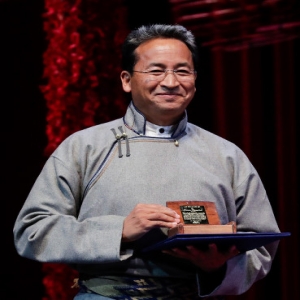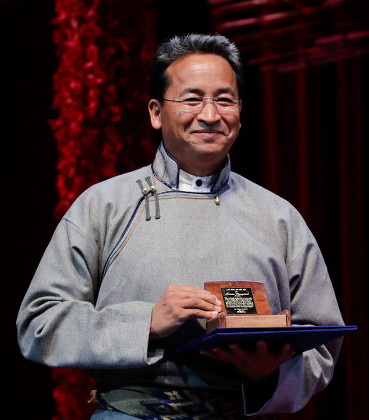
.png) Joseph Jerald SJ
Joseph Jerald SJ

Sonam Wangchuk, a renowned Indian engineer, education reformer, and environmental activist from Ladakh, has undergone a striking transformation—from being a celebrated national icon to becoming a controversial figure currently detained under the National Security Act (NSA). Once hailed for his innovative solutions and advocacy for education and the environment, Wangchuk's recent activism has sparked debate, raising questions about dissent, national security, and the limits of civic engagement.
Wangchuk's pioneering work spans education reform, environmental innovation, and grassroots community development. He co-founded the Students' Educational and Cultural Movement of Ladakh (SECMOL), an initiative that fundamentally restructured education in the region. At a time when only 5% of Ladakhi students passed the 10th-grade exams, SECMOL's alternative school model—based on experiential, hands-on learning—helped increase the pass rate to 75% within just seven years.
The SECMOL campus, which is entirely solar-powered and environmentally sustainable, has become a global model for eco-education. For his efforts, Wangchuk received the Governor's Medal for Educational Reform in Jammu and Kashmir in 1996.
His environmental innovation, most notably the Ice Stupa Project, earned international acclaim. In response to the acute water crisis caused by climate change and retreating glaciers, Wangchuk designed artificial glaciers—cone-shaped ice structures that store winter meltwater and release it during the spring planting season. This project became a hallmark of climate-resilient innovation.
Wangchuk's achievements culminated in 2018 when he was awarded the Ramon Magsaysay Award, often referred to as Asia's equivalent of the Nobel Prize. The award recognised his systemic, collaborative, and community-driven reform of education in India's remote northern region, setting a global example for minority and marginalised communities.
Initially, Wangchuk welcomed the abrogation of Article 370 in 2019, believing it would bring administrative attention and developmental opportunities to Ladakh. However, his stance shifted dramatically as he witnessed the unintended consequences of Ladakh's conversion into a Union Territory without a legislature.
Emerging key concerns include the erosion of democratic representation and the threat to local culture and demographics. Ladakh, where over 97% of the population belongs to the Scheduled Tribes, had previously been protected under Article 35A of the Constitution. With its removal, Wangchuk and others feared that the influx of outsiders and unregulated development could lead to demographic and cultural dilution.
Along with the above concerns was the alarming unemployment rate: 22.2% overall, 38.3% among women, and 26.5% among graduates—double the national average of 13.4%.
In response, Wangchuk emerged as the leading voice advocating full statehood for Ladakh and the restoration of an elected legislative assembly. For the past five years, he led non-violent campaigns—hunger strikes, mass mobilisations, and the 'Delhi Chalo' movement—calling for constitutional safeguards under the Sixth Schedule.
However, a recent protest in Leh escalated into violence. Police clashed with the protesters. Protesters pelted stones and set fire to the BJP office. Four people, including a former army personnel, were killed in police firing.
On September 26, 2025, Wangchuk and 80 others were detained under the National Security Act and transferred to Jodhpur Central Jail. The detention order accused him of inciting violence through provocative speeches referencing Nepal, Bangladesh, and the Arab Spring, allegedly threatening public order. Authorities also made controversial claims linking Wangchuk to Pakistan. Wangchuk's supporters vehemently deny these charges.
The government cancelled SECMOL's FCRA registration, citing alleged violations of foreign funding regulations.
Wangchuk's wife, Gitanjali Angmo, has filed a habeas corpus petition in the Supreme Court, challenging the legality of his detention. The Court has issued notices to the Centre and the Ladakh administration and has scheduled a hearing for October 14, 2025.
From his prison cell, Wangchuk sent a message expressing his willingness to remain imprisoned until the people's demands are met, reinforcing his image as a determined, non-violent Gandhian leader ready to sacrifice for his community.
There have been instances in the past where peaceful protests have turned violent. During the freedom struggle, a peaceful protest in Chauri Chaura (1922) turned violent, prompting Mahatma Gandhi to suspend the Non-Cooperation Movement. He condemned the incident, stressing that true freedom must be pursued through peace and discipline. Similarly, the Citizenship Amendment Act protests in Delhi and UP (2019), the Delhi communal riots (2020), and the Shaheen Bagh anti-CAA protests (2020), among others, all call for serious introspection.
The government authorities should realise that silencing the voice of dissent not only provokes but also unsettles the masses. An alienated populace, unheard and ignored, will create more disorder in society than open dialogue ever could. Proper stability comes not from suppression, but from listening, engaging, and respecting diverse voices.
Therefore, it is a crucial time for the government to recognise and address genuine grievances, such as constitutional rights, economic development, and regional autonomy, with sincerity, to cut off the roots of agitation. Mischaracterising protesters as anti-national would fuel alienation and more violence.